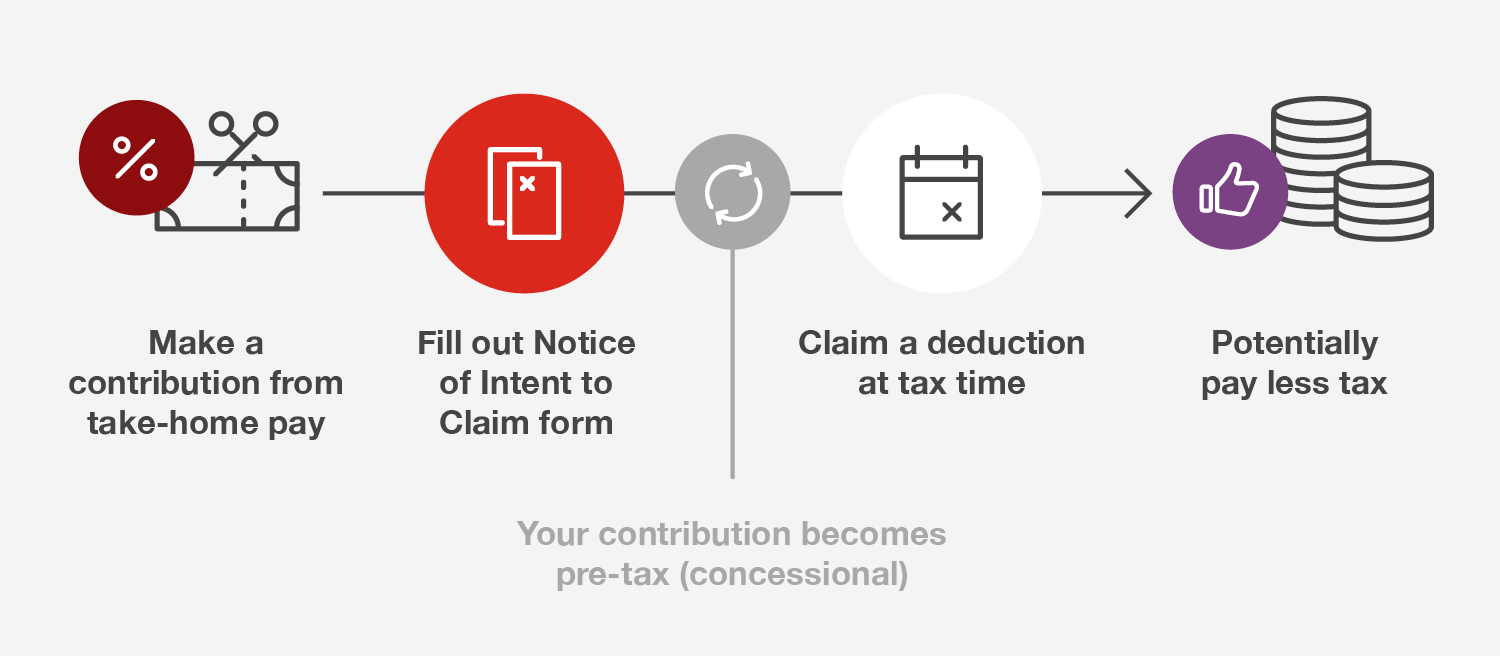5 popular contribution strategies
May 18, 2023
Considering putting extra money into your super? We list 5 popular ways to grow your super. And, depending on your chosen strategy and eligibility, you may even pay less tax!
1. Contribute to your super and you could claim a tax deduction
If you’ve got a bit of spare cash, you can consider making an additional personal (post-tax) contribution to your super from your take-home pay (at an amount and frequency that suits you). You could then claim a tax deduction and potentially pay less tax. As any contributions that you claim as a deduction count towards your concessional (pre-tax) contributions cap, you will need to be under this cap, which is $27,500 for the 2022-23 financial year (otherwise you’ll attract additional tax).
To claim your tax deduction, you’ll need to let us know by submitting a ‘Notice of intent to claim’ form. You can do this by completing this form and returning it to us via email or post.
Here’s how it works:
2. Government co-contribution
Money from the government, into your super? If you earn $42,016 or less in the 2022/2023 financial year and make up to a $1,000 post-tax contribution, you may be eligible to receive a maximum entitlement of $500 contributed to your super account by the government. The co-contribution amount works on a sliding scale, phasing out at a maximum income of $57,016 for the 2022/2023 financial year.
Some rules do apply, but if you are eligible, the Australian Taxation Office (ATO) will automatically pay the money into your super account after you have lodged your tax return. There’s no paperwork to complete - the money will be automatically added to your super.
3. Salary sacrifice
If you’re a fan of ‘set and forget’ (and reaping potential tax benefits) then this could be the option for you. You can ask your employer to send a bit of money from your pay, each payday, into your super. Those contributions are generally taxed at a lower rate of 15%* compared to your usual income, meaning you may pay less tax. This is because salary ‘sacrificed’ contributions are classified as employer super contributions, rather than personal contributions.
There are eligibility conditions and it’s important to note that any contributions made through a salary sacrifice arrangement will count towards your concessional (pre-tax) contributions cap of $27,500.
4. Spouse contribution
If your spouse has a total income of $37,000 or less, contributing to their super can be an effective way to grow their retirement savings while also reducing your tax. In fact, you may be able to claim a tax offset of 18% on the first $3,000 of spouse contributions you make to their super account (up to a maximum of $540). This can be a great strategy if one person has taken time out of their career to stay at home with children or care for a family member.
If your partner's total income is between $37,000 and $40,000 per year, you can still claim and offset but it works on a sliding scale.
5. Catch-up (carry-forward) contributions
If you have taken time off from work to care for children or a family member or if you are nearing retirement and want to maximise the amount you have in your super, then this option could be beneficial for you.
You may be able to ‘carry-forward’ any unused concessional (pre-tax) caps for up to five years, allowing you to make additional contributions above the yearly $27,500 cap to ‘catch-up.’
Step It Up
Want to take that next step with your super or finances? We’ll find you a simple solution.
If you’re wanting to maximise one or two areas of your super or finances and need some extra assistance, an Adviser from TelstraSuper Financial Planning can provide you with personal advice. Call us on 1300 033 166 or request a call.
*If your income and concessional contributions are under $250,000. If your income and concessional contributions are over $250,000, then contributions made on the amount in excess of $250,000 will be taxed additional 15%. Refer to ATO website for more information.
Any general advice on this website has been prepared without taking into account your objectives, financial situation or needs. Before you act on any general advice on this website, you should consider whether it is appropriate to your individual circumstances. Before making any investment decision, you should obtain and read the relevant product disclosure statement which is available on the Website or by calling 1300 033 166 between 8.30 am and 5.30 pm (AEST) Monday to Friday. You may wish to consult an Adviser before you make any decisions relating to your financial affairs. To speak with an Adviser from TelstraSuper Financial Planning call 1300 033 166.

